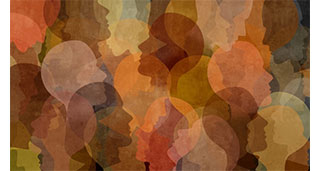Winter Session Highlights
Search for more classes

Intro to Criminal Justice
Major Issues in Criminal Justice (CJBA 101 – 501: In Person)
This is an introductory course on the major problems in criminal justice. Students will develop understanding of the criminal justice system and its components and examine and evaluate critical issues and problems in the criminal justice system today. Students will learn about the importance of empirical research and how to read scholarly articles about criminal justice.
Criminal Justice: Theory in Practice (CJBS 300 – 597 / 598 / 599: Online)
This course builds upon knowledge acquired in previous courses and connects theoretical approaches with practical applications. Students will study a broad array of assessments and evaluations of the policies and programs that have evolved in the field of Criminal Justice. Students will review and analyze experiments such as D.A.R.E., Minneapolis Domestic Violence and Kansas City Preventive Patrol in the light of relevant criminal justice theories. The ultimate goal of the course is to provide students with essential skills for critically evaluating and assessing programs, based on findings from empirical studies and the scholarly literature.
Enrollment Requirements: ENG 201 and CJBS 250 and either CJBS 101 or CRJ 101
Introduction to Criminal Justice Management (CJM 101 – 599: Online)
This course is an introduction to prominent administrative and management challenges across the three major focal areas of the criminal justice system - law enforcement, courts, and corrections. Within each of these focal areas, students will explore the relationship between administrative actors (behavior) and administrative failures (outcomes). The course will also expose students to contemporary innovations that were a direct response to administrative and managerial failures.
Introduction to Corrections (COR 101 – 599: Online)
This course is intended as an introduction to the corrections system and will provide an overview of current institutional practices, policies and legal issues. The course focuses on the relation of corrections to the criminal justice system, theories underlying correctional practice and the role of institutions within the corrections system. Specifically, this course provides an overview of the field of corrections. It reviews the historical development of crime and corrections, sentencing, jails, prisons, correctional policies, agencies, prison life, and challenges facing correctional populations. It will further explore the principles and practices of treatment accorded to offenders in various types of correctional settings.
The Law and Institutional Treatment (COR 201 – 599: Online)
The process of law from arrest to release from confinement in its relation to correctional principles and practices. Functions of the police, defense, prosecution, courts, probation, correction, parole. Civil rights of the accused and the convicted. Legal documents relating to commitment, bail, fines, and writs.
Enrollment Requirements: ENG 101 + COR 101/CRJ 101/ ICJ 101/CJBS 101 + Sophomore standing

Multiculturalism & Diversity
Race and Ethnicity in America (AFR 125 – 599: Online)
This course examines racial and ethnic issues in American society from the perspective of justice. Among the key concepts that will be discussed are race and ethnicity as social constructions and the causes and effects of constructing individual racial/ethnic identities. Using demographic information, the course investigates how well various ethnic and racial groups are doing in areas such as income, human rights, education, and employment.
Gender & Work Life (CSL 260 – 599: Online)
In this interdisciplinary course, articles from a variety of disciplines including counseling, history, psychology, economics, sociology, gender studies, and organizational studies will be read to understand the changing roles and expectations of people at work in the U.S. Students will explore the meanings of gender, race, ethnicity, class, accessibility issues, and sexual orientation in human development. The course will address how formal and informal types of social control associated with these categories operate in career options and choice, and experiences in the workplace. Students will also explore what activities constitute work. For instance, can parenting or other forms of unpaid labor be considered a job.
Enrollment Requirements: ENG 201
Latinx Communities in the United States (LLS 124 – 599: Online)
This course is an interdisciplinary introduction to the field of Latin American and Latinx studies focusing on the establishment and development of the diverse Latinx communities in the United States through the processes of migration, colonization, racialization, and integration. Students will explore the intersections of race, class, ethnicity, gender, and sexuality through such topics as identity formation, language rights, economic and political participation, transnationalism, law and civil rights and social justice movements.
Introduction to Latin American History (LLS 130 – 599: Online)
This is a survey course spanning Latin America's history from the pre-Columbian period to the recent past. Focus is on the origins and development of Latin American social, political and economic systems, Amerindian and African peoples, the legacies of colonialism and slavery, the pursuit of nationhood and identity, the persistence of inequality, and the role of the United States in shaping the destiny of the region.
Music in World Culture (MUS 104 – 599: Online)
This course explores the traditional and modern musics of selected world cultures, examining both their styles and their socio-cultural backgrounds. Areas to be studied may include Africa, India, Indonesia, and/or other regions, as well as diasporic communities in New York City.

Social Justice & Ethics
Systems of Law, Justice and Injustice Across Cultures (ANT 315 – 598: Online)
Using the perspective of anthropology, this course investigates concepts and practices of law, justice and injustice across cultures. Students learn about and critique methods of dispute resolution, and concepts of justice, norms, punishment and rehabilitation. Students engage with ethnographic cases studies - ranging from non-Western, small scale communities to totalitarian and capitalist systems, that explain how different types of societies configure power, maintain order and how they negotiate, mediate and adjudicate conflicts. Students also learn about the integrated cultural aspects of systems of injustice such as gender exploitation, racism, xenophobia and colonial and post-colonial forms of domination as well as cultural movements and transcultural legal concepts such as human rights, that attempt to resist these systems.
Enrollment Requirements: ENG 201 and any ANT or LAW course and Junior standing or above
American Cultural Pluralism, Justice and the Law (ANT 330 – 599: Online)
People’s struggles in the law against injustice in the U.S. are also cultural struggles. Sometimes, those struggles are for equal legal rights and recognitions. Other times, oppressed groups struggle to maintain their self ?determination and sovereignty. Collective legal aspirations are intertwined with custom and definitions of community. Through legal and ethnographic cases, this course examines the anthropological concept of cultural pluralism and the ways in which different racial, ethnic, new immigrant, LGBTQ and other identity groups struggle to assert cultural and legal claims in the context of United States law.
Enrollment Requirements: ENG 201; Junior standing or above
Environmental Justice (EJS 300 – 599: Online)
Environmental justice is defined as the fair treatment and meaningful involvement of all people regardless of race, color, national origin, or income with respect to the development, implementation, and enforcement of environmental laws, regulations, and policies. Drawing from the social sciences, the humanities, and the sciences, this interdisciplinary course will provide students with an understanding of the main principles and issues of environmental justice, emphasizing their international scope and the inextricable connection of the local and the global in matters of environmental equity.
Enrollment Requirements: ENG 201 and Junior Standing
Making Waves: Troublemakers, Gadflies & Whistleblowers (ISP 322 – 501: In Person)
This general education course in the Justice Core: Struggles for Justice and Equality in the USA area examines historical and contemporary examples of people who make waves -- often at great personal risk -- to achieve social, political, economic, and moral justice in America. Readings, films, and other depictions consider the motives, methods, and consequences to those who live in the United States, such as labor leaders, corporate whistleblowers, and political agitators, who stand up to powerful people and institutions to expose what they perceive as dangerous secrets and gross injustice.
Enrollment Requirements: ENG 201
Ethics and Law (LAW 310 – 599: Online)
Inquiry into the relationship between morality and law; their organic interrelationship in the natural law tradition; their separation in positivism. The contemporary debate illustrated by the issues of human and civil rights; the enforcement of sexual morality; civil disobedience, and the ethics of law enforcement.
Enrollment Requirements: ENG 201 and any Philosophy course

Arts & Culture
Arts and Culture in the African Diaspora (AFR 132 – 599: Online)
This course examines the arts and cultural production in social justice movements across the African Diaspora. Course sections examine different genres of cultural production, focusing on the ways in which the arts both impact and are influenced by social and political happenings. Possible topics include dance, oral tradition, spoken word poetry, hip hop, theater, and visual arts. Special attention will be paid to the intersections of creative expression and performance and how these practices shape our concepts of the African Diaspora.
Intro to Cultural Anthropology (ANT 101 – 598 / 599: Online)
This course is an introduction to cultural anthropology, the study of human societies and cultures. Students will examine the concept of culture in historical and global perspective, and learn tools for cross-cultural comparative analysis with an emphasis on critical thinking in relation to cultural values and practices, variation in human behavior, the organization of social life, and the making of cultural identity. Cross-cultural topics include subsistence, power and law, gender, family and kinship, language and intercultural communication, and the impact of globalization on human societies. Students will also learn fundamental concepts in anthropology to better understand the causes and conditions of our contemporary world.
Sex and Culture (ANT 210 / PSY 210 – 598 / 599: Online)
Study of behavioral and psychological differences between males and females in the light of contemporary theories of social structure, social learning, and individual development. Emphasis on the examination of contemporary theoretical issues in cross-cultural perspective.
Enrollment Requirements: ENG 101 and Sophomore Standing
Culture and Crime (ANT 230 – 597 / 598 / 599: Online)
This course examines crime, criminality and responses to crime from an anthropological and cross-cultural perspective. Students will analyze the concept of crime as a cultural construct and as a social phenomenon and consider its causes, factors and complexities in a global context. Norms and transgressions will be explored through ethnographic case studies of and cross-cultural research on a variety of world cultures and how power, economics, identity, gender, religion, and other meaning systems are integrated with these transgressions on local, national and global scales. Students will study cases critically and learn qualitative anthropological methods such as interviews and observation to consider and compare examples of and attitudes toward crime in their own society.
Enrollment Requirements: ENG 101
Culture and Personality (ANT 310 / PSY 310 – 599: Online)
This course examines the factors in, and the effects of, cultural conditioning on the biological foundations of personality. A study, on a cross-cultural basis, of the conditioning factors of child care and training, group values and attitudes, practices and culture forms, with reference to basic personality formation.
Enrollment Requirements: ENG 201 and ANT 101 or PSY 101 or SOC 101 and Junior standing